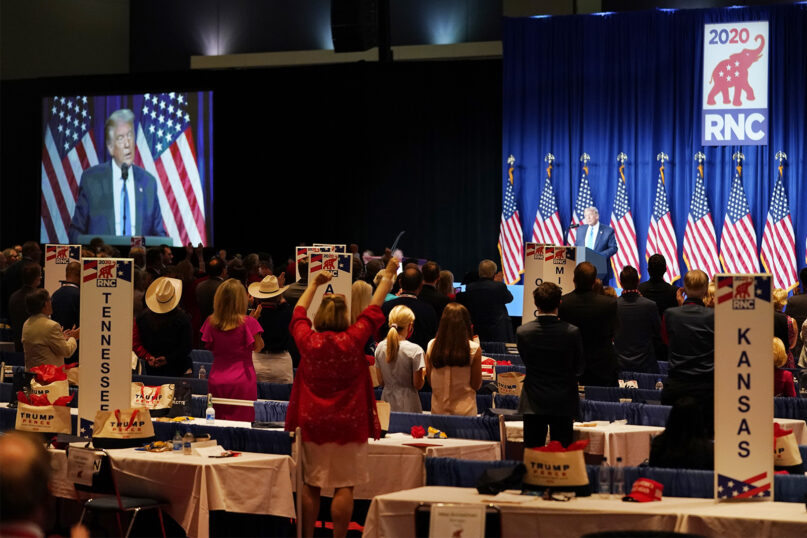(RNS) — This year, both the Republican National Convention and the Democratic Convention began, per tradition, with prayer.
But they were very different prayers.
While the DNC opened with an intercession calling for God’s blessing on “Republicans, Independents, and Democrats,” the RNC kicked off its proceedings with an invocation that made its partisan preferences clear.
“We pray that those in the other party will turn away from the darkness and join us in our march to you, our Lord and savior,” said Jay Shepard, a delegate from Vermont and self-described “Catholic, Donald Trump Republican.”
The convention closed out four days later with another religion-themed knock on Democrats, this time from Trump himself as he spoke before a crowd gathered in front of the White House.
“In this country, we don’t look to career politicians for salvation,” said Trump, referring to Democratic nominee Joe Biden’s campaign slogan “battle for the soul of the nation.”
“In America, we don’t turn to government to restore our souls. We put our faith in almighty God.”
The bookended faith references were emblematic of an aggressive approach to spiritual matters that played out over the course of the conservative assembly. If the recent DNC was one of the most vocally religious party gatherings in recent memory, this week’s Republican convening likely usurped that claim, with speakers repeatedly infusing their addresses with faith references.
But despite Trump’s dismissal of Biden’s slogan, spiritual battle was absolutely a theme at the RNC: whereas Democrats primarily highlighted Biden’s personal Catholicism, Republicans assumed an attacking posture, taking shots at their opponents and pairing appeals to Christian nationalism with suggestions that religious people are under assault in America — and that Donald Trump will protect them.
Charlie Kirk, a conservative activist and co-founder of the Falkirk Center at Liberty University, insisted in his speech that the U.S. was founded on “central biblical ideals” and suggested that Democrats had been quick to shut down churches while letting businesses stay open. He pointed to Nevada, where churches face stricter limits on the number of people who can gather inside than casinos do.
Donald Trump, he said, will be a “guardian of America” who will protect a way of life where “you can freely practice your religion and that church is more essential than a casino.”
Donald Trump Jr. echoed that message later that same night.
“People of faith are under attack,” he said. “You’re not allowed to go to church, but mass chaos in the streets gets a pass. It’s almost like this election is shaping up to be church, work and school vs. rioting, looting and vandalism — or, in the words of Biden and the Democrats, ‘peaceful protesting.’”
Religious leaders have both opposed in-person worship during the pandemic and participated in many of this year’s demonstrations for racial justice. Clergy were also among the demonstrators forcibly cleared from Lafayette Square outside the White House shortly before Trump walked across the park to stand for a photo-op in front of St. John’s.
Yet, with rare exceptions, speakers at the RNC cast faith and liberal-leaning demonstrations — including those who kneel during the national anthem in protest of racial injustice — as mutually exclusive.
“In President Trump’s America we light things up, we don’t dim them down,” said former Fox News personality Kimberly Guilfoyle. “We build things up, we don’t burn them down. We kneel in prayer and we stand for our flag!”
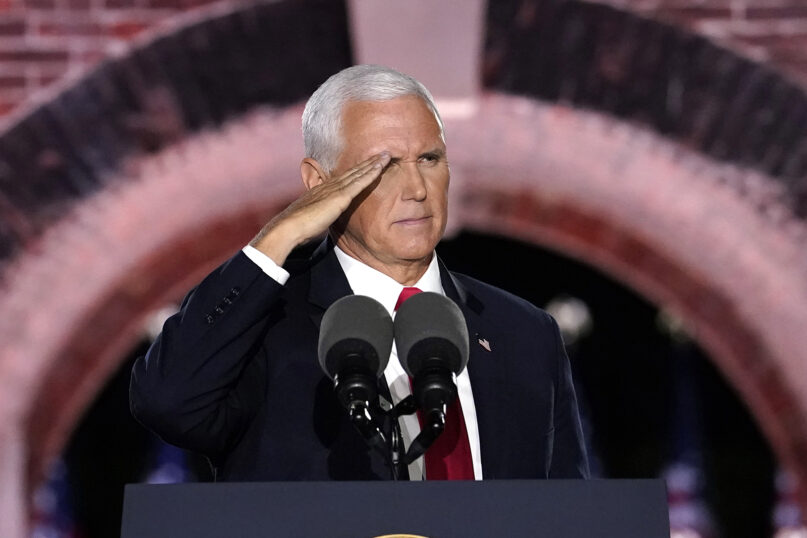
Vice President Mike Pence salutes as he speaks on the third day of the Republican National Convention at Fort McHenry National Monument and Historic Shrine in Baltimore, Wednesday, Aug. 26, 2020. (AP Photo/Andrew Harnik)
Fusions of God and country grew even more explicit as the week progressed, with Vice President Mike Pence combining references to the American flag with Bible verses in his speech.
“Let’s fix our eyes on Old Glory and all she represents, fix our eyes on this land of heroes and let their courage inspire,” Pence said. “Let’s fix our eyes on the author and perfecter of our faith and freedom, and never forget that ‘where the spirit of the Lord is, there is freedom,’ That means freedom always wins.”
All the while, Democrats in general — and Joe Biden and Kamala Harris in particular — were cast as enemies of faith.
“The Biden-Harris vision for America leaves no room for people of faith,” said Cissie Graham Lynch, daughter of evangelist Franklin Graham. “Whether you’re a baker, a florist, or a football coach, they will force the choice between being obedient to God, or to Caesar.”
RELATED: Citing Scripture, Pence switches out Jesus for the American flag in convention speech
To be sure, not all faith references were framed as criticisms. Alice Johnson, a criminal justice reform advocate and ordained minister, invoked religion while discussing the passage of the First Step Act, a rare moment of bipartisanship under Trump that benefitted from ample lobbying by evangelical leaders.
“I hollered, ‘Hallelujah!’” Johnson recalled. “My faith in justice and mercy was rewarded.”
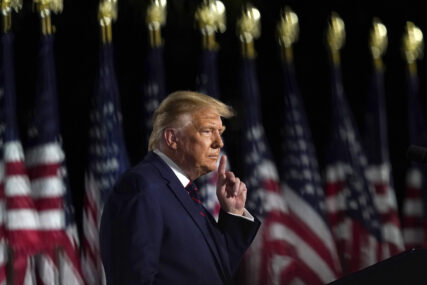
President Donald Trump speaks from the South Lawn of the White House on the fourth day of the Republican National Convention, Thursday, Aug. 27, 2020, in Washington. (AP Photo/Alex Brandon)
The conference also featured a video showing an exchange between Trump and Andrew Brunson, the American evangelical pastor imprisoned in Turkey for around two years before the Trump administration helped secure his release.
But attacks on Biden were a constant, some of which were overt critiques of his personal faith — usually when referencing the former vice president’s stance on abortion rights. Lou Holtz, a renowned football coach who led Notre Dame’s team to victory on multiple occasions, derided Biden and Harris’ campaign as “the most radically pro-abortion campaign in history.”
“They and other politicians are ‘Catholics in Name Only’ and abandon innocent lives,” he said. (Harris attends a Baptist church and is not Catholic.)
Sister Dede Byrne, a Catholic nun, also decried the Biden-Harris campaign as “the most anti-life presidential ticket ever.” She championed Trump as a righteous alternative, saying she and others stand ready to take up metaphorical arms with his campaign in spiritual warfare.
“He has a nationwide army of religious standing behind him,” she said. “You’ll find us with our weapon of choice … the rosary!”
Democrats took thinly veiled shots at Trump’s faith during their convention as well, such as when comedian Julia Louis-Dreyfus quipped: “Remember, Joe Biden goes to church so regularly that he doesn’t even need tear gas and a bunch of federalized troops to help him get there.” But Republicans’ God-and-country rhetoric appeared aimed at shoring up the president’s support among white evangelicals and other white Christians who made up his political base. While some surveys report Trump retaining support among white evangelicals, others show him trailing among the faithful in the wake of the pandemic. There is also increasing uncertainty as to whether the president can maintain favor with white Catholics — a key force in Rust Belt swing states.
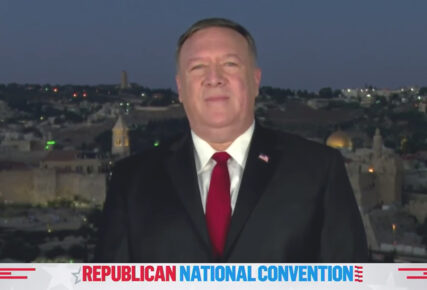
Secretary of State Mike Pompeo addresses the Republican National Convention, Tuesday, August 25, 2020, from Jerusalem. Video screengrab
Anxiety around these groups may explain why U.S. Secretary of State Mike Pompeo made the unusual decision to deliver a speech to the RNC filmed in Jerusalem, where he made reference to the Trump administration’s decision to declare the city the capital of Israel and move the U.S. embassy there. The speech triggered outcry even before it was delivered, with a Muslim civil rights group, Jewish Democrats and members of Congress arguing that it potentially violated a law that bars certain federal employees from engaging in political activities.
But it may have been a deft political strategy: The embassy move was deeply controversial among many religious groups in the U.S. and abroad when it was announced but remains popular among many evangelical leaders who hail it as a triumph.
Indeed, the Republican convention’s hard-edged approach may very well work for many voters and is proven to garner support among Trump’s base. Tony Suarez, vice president of the National Hispanic Christian Leadership Conference, said he and a number of Trump’s evangelical Christian advisers were seated together near the front of the crowd during Trump’s final speech Thursday night. As the president spoke, Suarez said attendees responded with chants, applause and more than a few shouts of “amen!”
But religious sniping can have diminishing returns: Holtz’s shot at Biden’s Catholicism spurred the president of Notre Dame to issue a statement declaring that “we must never question the sincerity of another’s faith, which is due to the mysterious working of grace in that person’s heart.”
Christian nationalism may also be wearing on voters. Some pastors — including evangelicals — were quick to express outrage at Pence’s replacement of Jesus with the American flag.
Time will tell whether attacking the faith of Democrats, invoking Christian nationalism and framing Trump as a champion of religious liberty will be enough to retain the support that catapulted him into power in 2016. For now, Republicans seem far more eager to cast him as a defender of faith than a portrait of piety: Shepard, who offered the opening prayer, even appeared to acknowledge Trump’s shaky personal relationship with religious matters.
“We recognize that faith is a journey,” he said. “It’s not where we start that journey, but where we are now and where we strive to be. Help us all follow President Trump, whose actions show he is on the journey to you, Lord.”
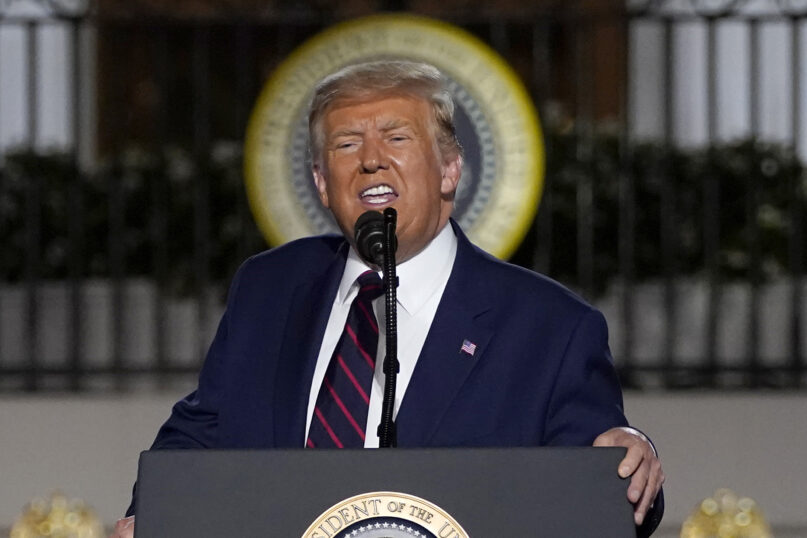
President Donald Trump speaks from the South Lawn of the White House on the fourth day of the Republican National Convention, Thursday, Aug. 27, 2020, in Washington. (AP Photo/Evan Vucci)
